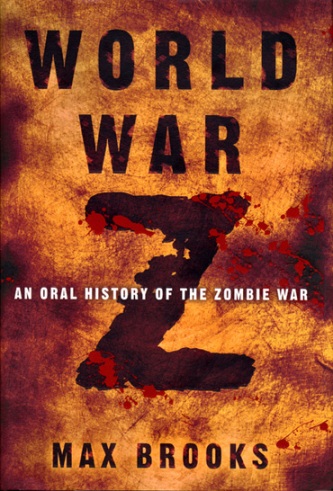

Infectious disease medical doctor
Mark Crislip
compares zombies to real plagues
IN THE "SPECIAL PAGE" ARCHIVES:
John Russo
Joe R. Lansdale
Ellen Datlow
Lisa Morton
Owen King
John Shirley
Brent Monahan
Joe McKinney
Simon Clark
Zombies in Real Life
by Mark Crislip, MD
Last night I finished a book titled World War Z, an oral history of the Zombie War by Max Brooks. If you like that sort of thing, and I do, it is a fun read. What, you may ask, does a book about Zombie's have to do with Infectious Disease?
Dude.
Everything has something to do with Infectious Diseases. I.D. is the Kevin Bacon of connectedness.
Infections, of course, have done more to change the world than most people realize and if you pay any attention to the history of world you quickly notice it is also the history of infections. Plagues of all kinds have continually swept though the world and killed enormous numbers of humans. Up to two-thirds of Europe died of a plague in the middle ages. The 1918-1919 flu pandemic killed about 2% of the world's population. That flu pandemic was by a bird flu strain, and if history repeats itself, if the next strain kills 2% of the world, well, 2% of six billion is a lot of people.
In WWZ, the zombie plague is spread by the bite of a zombie, it infects the bitten who die, and then are reanimated as a zombie that eat the living and are only killed by having their brains destroyed. Typical zombie fare, but the story takes place after a zombie pandemic that almost annihilates the human race and is told from the perspective of the survivors.
As an I.D. doc, I could substitute flu, or smallpox, or bubonic plague and see the book as a metaphor for the effects of a world-wide contagion. The world is primed for a huge pandemic.
We were lucky that SARS was not all that infectious and that it came to a county with a first class health care system like Canada and not one with a second rate system like, oh, I don't know, the USA.
Large populations with widespread travel would make it easy for a plague to rapidly spread across the world. The 1918 pandemic swept the world before air travel. If you have ever wandered the rat warrens of Chicago O'Hare, and imagined if some lunatic terrorist decided to infect himself and wander the airport, how quickly you could infect huge numbers of people.
I.D. docs, and those in public health, do worry about pandemics and what would happen if, as is expected, half your work force does not come to work due to an influenza or zombie pandemic. It has the potential to be a real nightmare.
One of the better chapters of the book from a medical point of view (as opposed to the creepy zombie army attacking and eating your innards point of view) is that early in the book, Breckenridge Scott is interviewed. He made a fortune selling a fake zombie cure called Phalanx. The character is the archetype of every purveyor of supplements in the US, from Airborne to Enzyte and I need to see if I can get the whole chapter reprinted.
A good horror novel, or any other work of fiction, needs to stand on its own. WWZ is a fun, creepy read. A great piece of fiction has a broader understanding of the human condition, and read as a possible example of any post plague existence, WWZ works at the higher level as well.
Read it for fun, read it to be creeped out, read it to look at how our world could react to a global catastrophe of, oh, climate change and the resulting spread of many forms of zombies, er, I mean, infections.
Mmmmmmmmmmm. Brains.
I beat a metaphor to death, only to have it rise again. Kind of like, yes, zombies.
The CDC (Center for Disease Control) shows that since school started, there is a big spike in flu like illnesses. Crowd a bunch of vectors in classrooms all across the nation and, viola, flu. I was hoping that the flu would be kind enough to wait until the vaccine came out, but no such luck.
If we do not act soon, and we won’t and, due to a lack of vaccine, can't, it will spread fast in a susceptible population. Like zombies.
If there were a zombie outbreak we would all be toast in no time.
"If the timescale of the outbreak increases, then the result is the doomsday scenario: an outbreak of zombies will result in the collapse of civilization, with every human infected, or dead," the CDC wrote. "This is because human births and deaths will provide the undead with a limitless supply of new bodies to infect, resurrect and convert."
"How fast do we need to deal with the outbreak? Here's the equation they used, where S = susceptibles, Z = zombies and R = removed. If an infection breaks out in a city of 500,000 people, the zombies will outnumber the susceptibles in about three days."
Will quarantine work? Nope.
"In this case, the effect of quarantine is to slightly delay the time to eradication of humans."
Treatment? Under the assumption: "...we are able to quickly produce a cure for ‘zombie-ism’. Our treatment would be able to allow the zombie individual to return to their human form again. Once human, however, the new human would again be susceptible to becoming a zombie; thus, our cure does not provide immunity. Those zombies who resurrected from the dead and who were given the cure were also able to return to life and live again as they did before entering the R class."
Under that assumption, "humans are not eradicated, but only exist in low numbers."
But we have an advantage over flu. We can induce immunity, which, due to antibodies, is the equivalent to "control (of) the zombie population by strategically destroying them at such times that our resources permit. It was assumed that it would be difficult to have the resources and coordination, so we would need to attack more than once, and with each attack, try and destroy more zombies."
Sounds like a flu vaccination program, and with good results: all the zombies are gone.
"An outbreak of zombies infecting humans is likely to be disastrous, unless extremely aggressive tactics are employed against the undead. While aggressive quarantine may eradicate the infection, this is unlikely to happen in practice. A cure would only result in some humans surviving the outbreak, although they will still coexist with zombies. Only sufficiently frequent attacks, with increasing force, will result in eradication, assuming the available resources can be mustered in time.”
Zombie? HIV? Influenza? Any real difference? Disease spread is disease spread, be it from being bitten by the undead, sex, coughing or, worst case, all three at once.
At least I read World War Z and the Zombie Survival Guide. I will survive. Will you?
Rationalization:
http://www.mathstat.uottawa.ca/~rsmith/Zombies.pdf
http://www.wired.com/wiredscience/2009/08/zombies/
About Mark Crislip

Mark Crislip, MD, has been an infectious disease doctor in Portland, Oregon since 1990. As a child, one of his intellectual epiphanies was the PBS show Connections, by James Burke, where he learned how seemingly unrelated phenomena are often interconnected.
Unanticipated connections are part of what makes infectious diseases the most endlessly fascinating specialty in medicine.
Since 1986, Dr. Crislip has been blogging about his specialty, first on his own website and now at Medscape. Every day he makes infectious disease rounds in the hospital and see at least one cool case or learns something new. Why be selfish and keep all of that wonder and knowledge to himself? Each entry is a short description of an interesting case, a curious factoid or two and a lame attempt at humor.
Besides his Infectious Disease blog, he is an Editor and writer for the Science Based Medicine blog, has three podcasts, an iPhone/Android Infectious Disease application and other projects. His growing multimedia empire can be found at edgydoc.com. In his spare time, well, that his how he spends his spare time after work and family. Sleep optional.
Mark recommends this site for more scientific zombie stuff HERE
You can read more about Dr. Crislip in
PUSWHISPERER: A Year in the Life of an Infectious Disease Doctor HERE

